#ipc as a metaphor for the patriarchy is not something I expected to stumble upon today
Explore tagged Tumblr posts
Text
Oh my god this is amazing and it honestly reminds me so much of that one post I made on Childe way back in the day, which is not to make it about me, but rather point out that hoyo has done this before, making a male character’s anchors and people he turns to rely on typically women
And thank you oh my god thank you for pointing out that Acheron is also the one who saved him, I love Aventio with all my heart but I genuinely start tweaking when people give all the credit to Ratio when she’s right there,
Moreover, I find it really interesting that like the 2 male characters we see interact positively with Aventurine (minus the trailblazer) are Argenti and Dr. Ratio, both of whom are purposefully feminine, I don’t think I have to explain Argenti but the developers have Ratio that outfit and made him wear makeup for a reason. Even the men Aventurine has trusted in his life share traits with the women he puts his faith in.
Also, within his character stories, I find it very interesting that the stoneheart who seems to dislike him the most is Opal, who is a) a man, and b) seemingly far more masculine than Aventurine is, as he positions himself as more competent and more efficient (due to how violent he is) than Aventurine, which are traits typically associated with masculinity. Perhaps it’s even more rewarding then that Aventurine won not because of how Opal would do things (in a more masculine manner by likely brute forcing it and absolutely wrecking Penacony), but his own version, relying on his intelligence and the relationships he forms with the people; especially women around him, which can be interpreted as feminine due to peacefulness (even if his plan was batshit insane), the ability to negotiate, and well, fine prominence of women being associated with femininity, at least hoyo’s version of it, as female characters more often then not are made into people the audience desires to look up to.
This also calls into question the relationship with his father, which Aventurine unfortunately never got the privilege of knowing. He says he still has his father’s shirt, even today, which makes me think the tattered one we see him wearing IS that shirt. Metaphorically and literally, Aventurine is slotting himself into the role of his father, as the man who is destined to not only take care of his family (which he failed at), but save his clan (which he seemingly also failed at).
It’s no wonder that with that and everything else you’ve stated, Aventurine turns to women, because at least I think some part of him thinks he failed as a man. However, Aventurine is extremely resilient, and the Mother Goddess didn’t bless no bitch so he’s gonna pick himself back up again and fight for his future, aided by both women (literally everyone), and men (Dr. Ratio + Argenti) as he tears off the roles that have haunted him his entire life, both in terms of power dynamics AND gender, ultimately becoming the man, becoming the person he deserved to be by forgoing the ways in which he was forced to look and behave in the past.
He’ll still put on that helpless facade, and he will still put his faith in women time and time again because Aventurine knows he can, but he isn’t going to limit himself to that alone anymore. Aventurine has learned the merits of humanity, all of humanity, including his own and those who he has lost his faith in. And I find it to be such an uplifting message for Aventurine’s story to not conclude with him being disconnected from half the population, from a significant portion of humanity. His journey in Penacony wasn’t just one of self discovery and reflection, but of learning about the world as well, and witnessing the good and evil of others that he hadn’t prior.
And what really gets me is that Aventurine didn’t believe he would change, that he could change. Again I know this is a post centered on women but god you can’t just have Aventurine without mentioning his relationship with Ratio.
He EXPECTS Ratio to betray him, to use him, to complete his task and leave the other to rot like every other man he has met before has done. But Ratio doesn’t, he adamantly refuses to and even if Aventurine doubts that Ratio cares for him, time and time again will Ratio demonstrate that he does. Moreover it’s not because he has anything to prove to him, like all the women in his life, Ratio just, well, Cares, and that ability to possess a trait that Aventurine has so far only ever seen in women shakes him a lot.
He doesn’t believe it, he can’t believe it, how could one ever expect him to believe it?
Until his conversation with Acheron. Until she saves him, can he accept that a man would too. Because Aventurine cannot trust men easily, but he can trust the judgement of women. And if the emanator of Nihility, the woman who has spent her entire life guiding others and attempting to create meaning in their lives, tells you that That Man you have been on the fence about is Your FRIEND and will help provide you the answers as to why you should continue to live on in the first place, you fucking listen to her.
Now, Aventurine is truly no longer shackled to his past, because he has put his (incredibly reasonable) biases behind him, and will now be able to get his well deserved retribution.
Fitting how he will also do that with a man, because it was never men that were the problem, but the system itself which caused them to be that way, and Boothill and Aventurine are going to be the ones to dismantle it.
So yeah, I love this post. Do I think what I have to say is what the developers intended? No, probably not. Is it how I think the story should be read? Yes, and thank you OP for drawing this out of my brain as I never would have noticed in the first place
Female Guidance in Aventurine's Life
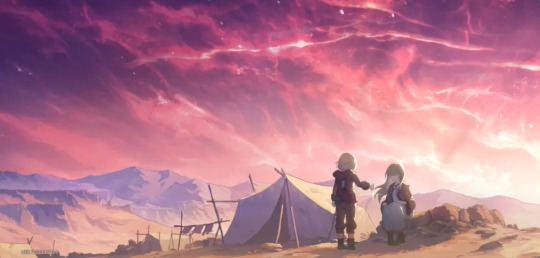
One thing I haven't seen discussed in much depth yet, but which I think is especially interesting, is the consistency of female guidance in Aventurine's life: Every single person who we have seen on screen offering Aventurine assistance or making a positive difference in his life is female (with one exception, yes, I'll get there).
Under the read more cause it's longggg:
Before even diving into his family, let's just get the obvious out of the way: Aventurine is, at least supposedly, blessed by a goddess. The very origin of his good fortune--be it actual blessing or curse--comes from the literal "mother goddess" who watches over him. This is one of the only instances in Star Rail where a god character is specifically given a gender, and Gaiathra is not ever ambiguous. She is the classic female fertility goddess with all the trappings of other famous triple goddess figures of the real world. Aventurine's personal belief in the goddess may be shaky, but he nevertheless continues to treasure his people's faith. Thus, at the core, we can say Aventurine is a character who is guarded by the most quintessential mother figure possible.
Now, with the most obvious out of the way:
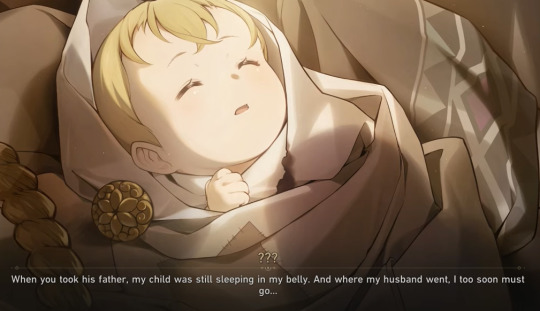
We know that Aventurine's father died before Aventurine was even born, and therefore he would not have any memories of his father, leaving him to be raised by his mother and sister.
Both women clearly made an enormous and lasting impression on Aventurine; they haunt every single one of his memories of Sigonia and are the key elements of the family Aventurine longs to return to. While he flirts with the concept of death as a way to see his family members again, it was also his mother and sister who instilled in him any sense of self-worth and meaning to his existence, the only things keeping him from giving up on living. His mother believed him to be blessed; his sister insisted to his face that not even the only remaining remnant of their mother had any value in comparison to his life.
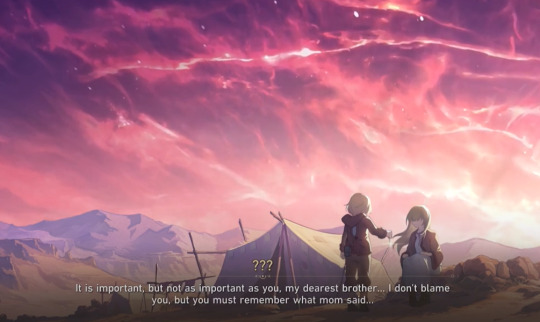
It is for his sister that Aventurine first begins expressing a self-sacrificial nature, and from his sister that this self-sacrifice is reinforced when she uses herself as a shield to help him escape massacre at the hands of the Katicans.
It is also from his sister that Aventurine learns many of the deeply meaningful actions he holds onto to the present day, despite having been so far removed from his own culture.
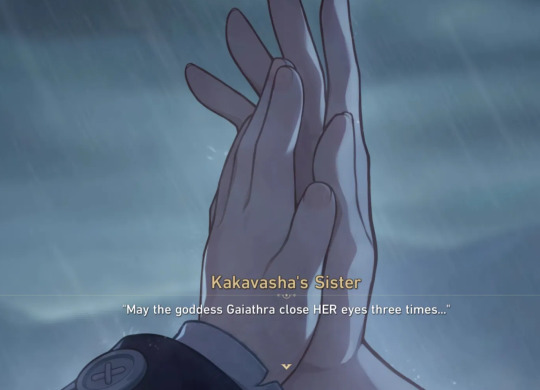
Conversely, every one of Aventurine's early negative experiences on screen appear to have been driven (at least primarily) by men.
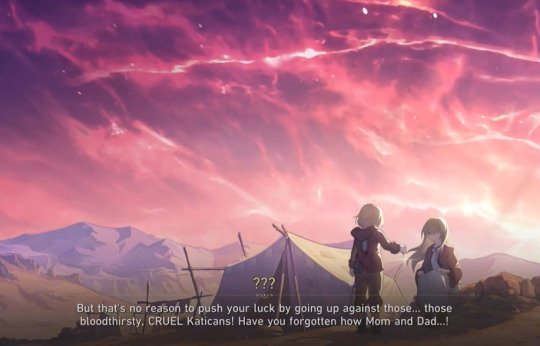
Although the Katican tribe of course would have both men and women, the tribal societies on Sigonia appear to be on the fairly traditional side, with Aventurine's mother staying at the camp with her child while his father was the one to go out and hunt for offerings for Gaiathra. This is also supported by Aventurine asking Jade to take him to her "chief" later on. Therefore, it is likely (although of course not guaranteed) that a majority of the Katicans' army was male, and that Aventurine's early experiences with outsiders consisted almost entirely of indiscriminate pillaging and massacre at the hands of what the Avgin viewed as savage, invading warriors. In separate instances, Aventurine was traumatized by these warrior figures three times--first with the loss of his father, then his mother, and then finally his sister.

And even their hope, supposed to come in the form of the "men in black" from the IPC, completely abandoned them, leaving Aventurine once again betrayed by masculine figures that were supposed to be there to protect him. Led by Oswaldo Schneider, another cruel male authority figure, the Marketing Department of the IPC permitted the wholesale slaughter of Aventurine's people--something which we know Aventurine is now aware of.
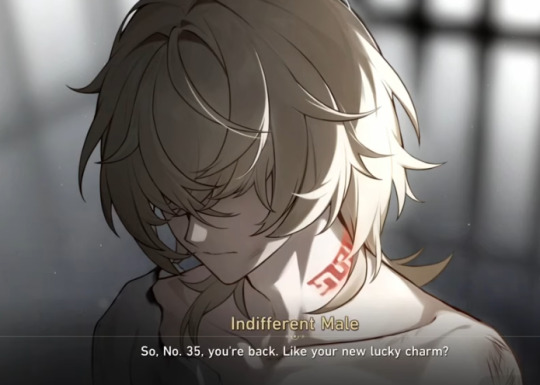
Then, of course, the next piece of Aventurine's backstory we're given is his male slave master. I don't really need to say anything about this, do I? This man violated Aventurine's human dignity and bodily autonomy, and forced Aventurine's hand in a life or death battle for which Aventurine still punishes himself mentally, even years in the future.
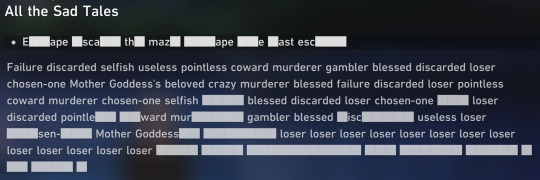
In part to escape the difficulty of his situation and rise to a position where he would have enough resources to--he thought--help his people, Aventurine joins up with the IPC. But when he attempts to make contact with a powerful man in the organization, Diamond, he is instead met by a woman, Jade, who against Aventurine's own expectations determines that she will raise Aventurine up (or use him as a tool, depending on how you currently choose to interpret Jade's motivations), granting him wealth and status beyond his imagination.
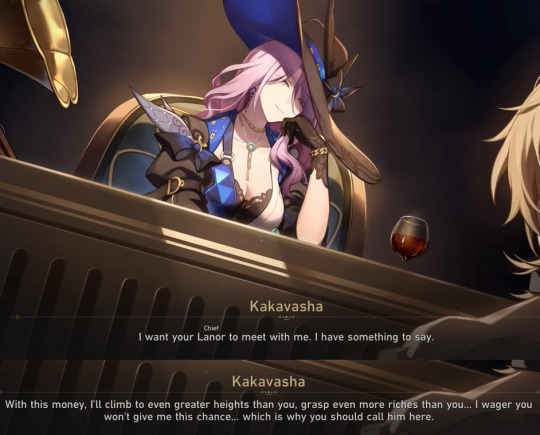
(And this line in particular is interesting, because you can take it one of two ways: 1) Aventurine comes from a patriarchal planet that traditionally put men into positions of power [thereby making his own slavery an emasculating act, aligning him further with disenfranchised women]; thus, he is making the assumption that to get anywhere in this organization, he will need to work with a man; or 2) He actually was counting on Jade taking his bet and helping him right from the beginning, because Aventurine perceives women as inherently more likely to protect and aid him than men would be.)
In the end, Jade does exactly as she claims she will, launching Aventurine into a position of power while also closing golden handcuffs around his wrists. She positions herself not only as his supervisor, but as his advocate and ally. She entrusts him with her Cornerstone, a sign of significant faith in his abilities. She even seems to be keenly aware of his bias towards the mother figure, referring to him as "child" in their conversations.

Whether this is genuine or a manipulation tactic can certainly be debated (and I'm not inclined to think at this point that Jade is a genuinely good role model or selflessly supportive person in Aventurine's life), but whatever the case, women are the only people Aventurine even remotely considers to be "in his corner."
We see this even earlier, in Aventurine's call to Topaz. Like with the example of his mother and sister, Aventurine trusts in Topaz's ability implicitly, and considers her above anyone else when it comes to completing the mission in Penacony.
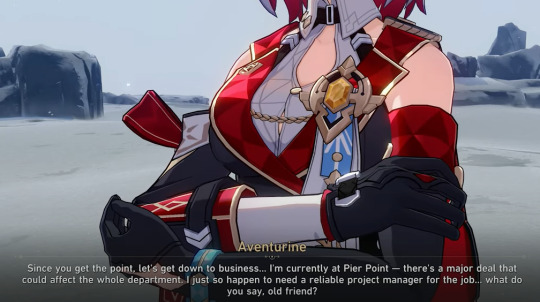
Although of course we don't know if Aventurine has any other friends or allies among the Strategic Investment Department, it seems very likely that Topaz, yet another woman, is the one he is closest with. At the very least, she is the only IPC character (so far) that Aventurine has a complimentary voice line for, one that shows his respect for her talent:

Over and over again, the story aligns Aventurine with female figures in positions of authority, and demonstrates that he is comfortable (although maybe not too comfortable, in the case of Jade) with relying on them and trusting their judgment, just as he did with his mother and sister.
And this pretty much goes off the charts in Penacony, where Aventurine has more involvement with the female cast than virtually any other non-female character (even the Trailblazer!). We set the pattern off right away, with Aventurine immediately being placed into a negotiation situation with Himeko, respecting her role as the Express's leader and working to get himself aligned with the Express by acquiescing to her request for support.
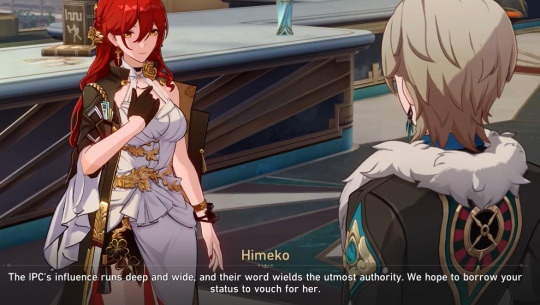
Then there's the fact that Aventurine is the one who finds Robin's body, an event which, although he didn't let it show too much, was almost certainly traumatic for him, given the violent death of his own sister.
Next, twice in Penacony's story, we see Aventurine seek out Sparkle for information. He may not personally like her and her comments may be both racist and dehumanizing, but Aventurine does rely on her--being the only character explicitly seeking her aid, which no one else in Penacony seems to want.
In 2.0...

And in 2.1.
Now, say it with me, guys: Aventurine built an entire portion of his grand plan around the idea that if he looked pathetic enough, a female character would absolutely come and help him. And sure enough, the women come through for him, always! Sparkle gives him the exact last clue he needs to confirm his belief that he could use "Death" to reach the true Penacony, sealing the deal for the rest of his plan.
His plan which also hinged significantly on Black Swan's involvement too, another woman that he views as, if not trustworthy, then at least intelligent and hyper-competent.
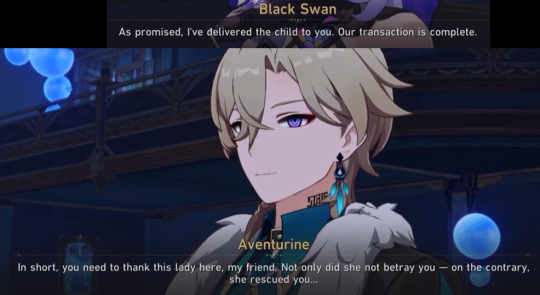
Contrast all this, of course, with the treatment Aventurine receives at the hands of Sunday, the lone opposing male character he faces in Penacony.
Sparkle implies that Sunday would humiliate Aventurine in an unmistakably sexual and degrading way, and Sunday himself professes this same desire to see Aventurine humiliated.
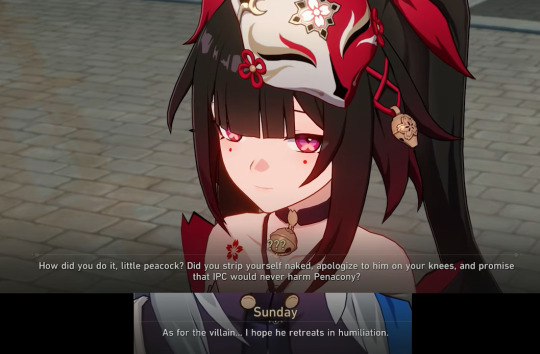
Then we're "treated" to the moment in which Sunday uses the Harmony's (or perhaps actually the Order's?) power against Aventurine, in a scene which is supposed to reflect an interrogation but is also, very clearly, another nonconsensual violation of Aventurine's bodily autonomy and dignity by a man. While ostensibly seeking confirmation of the Cornerstone ruse, Sunday instead subjects Aventurine to unnecessary questions about his past on Sigonia, which recall and force Aventurine to re-endure memories of his trauma.
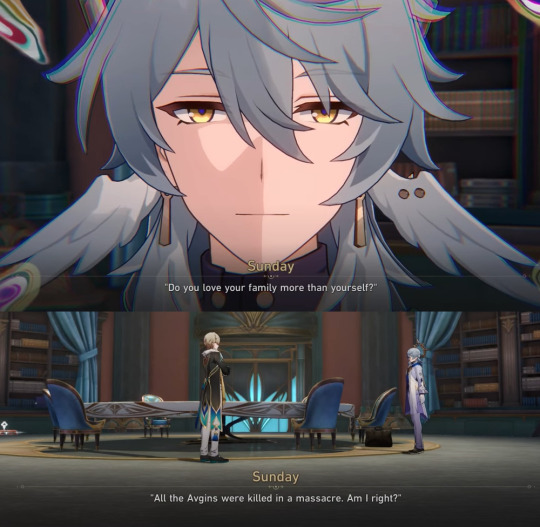
Even if this is what Aventurine prepared himself for and planned to have happen, the pain he experiences is very real, and he suffers both the physical and emotional consequences of Sunday's assault all the way up to his "Death" and possibly even beyond.
(Also, Sunday fans please don't get too up in arms with me for this; I also like Sunday! It's okay for characters to be morally grey!)
I think there's one other interesting example I would bring up here too, and that's Aventurine's conscious decision to weaponize his own masculinity against the Trailblazer. Through the 2.0 and 2.1 Trailblaze missions, Aventurine deliberately acts in an off-putting manner to the Astral Express crew, particularly the Trailblazer, in order to build up to the 2.1 climax where the Trailblazer is supposed to view him as an unrepentant villain and attack him without hesitation.
In order to achieve this uncomfortable, villainous effect, what does Aventurine do? Exactly what other men have done to him.
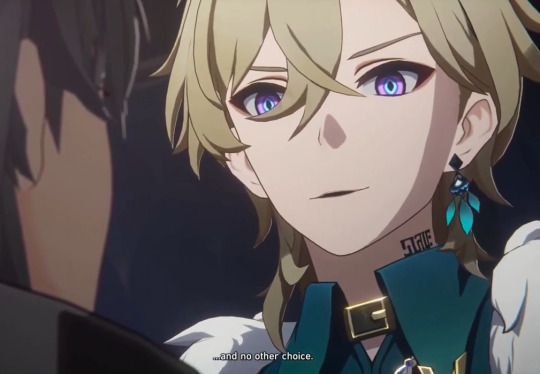
This is especially apparent if you're playing Stelle because of the ingrained societal taboo of a man entering a woman's personal space without consent, but even as Caelus, it is very clear that Aventurine is leveraging behaviors typically used to show dominance: In a complete 180 to all Aventurine's other body language in the game (normally quite withdrawn, frequently in defensive postures with his arms crossed or hand behind his back, almost always standing several feet away from other people), Aventurine violates the Trailblazer's personal bubble, looming over them (Caelus was sitting in this cutscene, lol), forcing eye contact, and commanding the space while informing them that they will have no choice.
For someone who was hunted, enslaved, had his movements restricted with chains, and due to his own slight stature has very likely been towered over by others who were intentionally asserting their power over him all his life, it is clear that Aventurine associates dominant, typically more masculine-coded physically-imposing behaviors with discomfort and even villainy.
Any girl who has ever had a man loom over her like this will realize very quickly: Aventurine wanted to make himself scary so he made himself act more like a bad man.
(Yes of course I know "not all men." I'm not saying every man behaves in this domineering way or that women cannot be domineering too, obviously, just that Aventurine had a very specific image in mind when constructing a "villainous persona," and the physically controlling tactics most typically used by aggressive men toward women was his immediate go-to.)
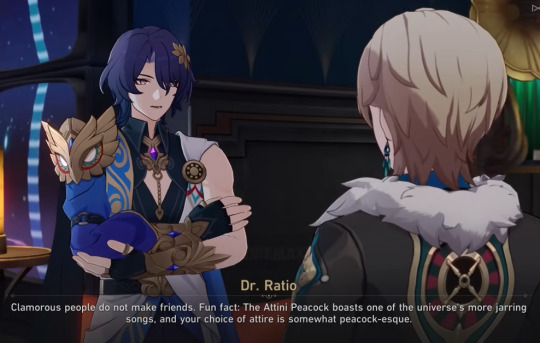
But where does that leave Dr. Ratio, the one male character actually on Aventurine's side?
Frankly, I don't want to derail my post about how intensely Hoyo chose to hammer on the message of "Women will protect you" in Aventurine's story with a discussion about a mlm ship, but the take-away here is going to lead in that direction anyway--so yes, Dr. Ratio is the exception.
What is interesting is that he does not come across as an exception at first, and in fact initially appears as another male character being rude and dismissive to Aventurine. Like, there are still people out there calling Ratio an unrepentant racist for this one.
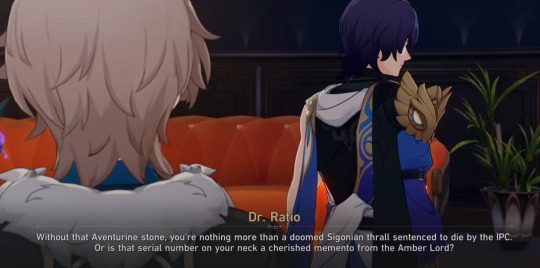
Of course, it's later clarified that this is an act--likely even these insults were scripted specifically to give Sunday's spying ears the "insight" he needed to exploit Aventurine during the interrogation.
But even though it is an act, Aventurine still has noticeable trouble putting his faith in Ratio. He does genuinely doubt him a few times, despite knowing that they are working together to fool the Family.
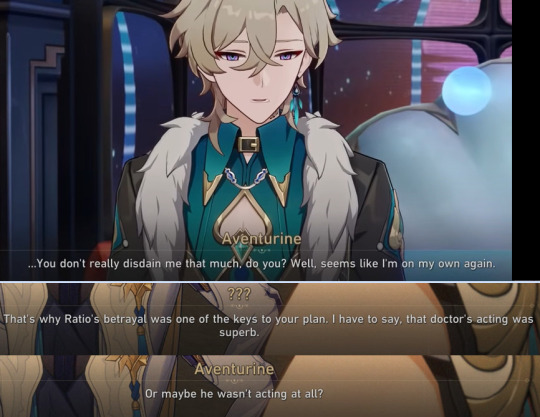
Even his voice line about Ratio confirms that he doesn't think Ratio particularly cares for him; rather, he thinks Ratio simply tolerates him because he's slightly less unintelligent than those around them.
Ultimately, the entire act with Ratio ends up being a mirror of the real scenarios Aventurine has been experiencing with men his whole life (at least as far as we are shown his life). Men abandon him to fend for himself (unwillingly, like his father, or willingly, like Diamond leaving Aventurine to deal with Penacony alone on the inside). Ratio keeps leaving Aventurine completely alone. Men attempt to humiliate him and violate his boundaries (like Sunday and his slave master). Ratio insults Aventurine's appearance and intelligence repeatedly. Men betray him (like Oswaldo Schneider and his men leaving the Avgin to die). Ratio "betrays" him.
I'm not saying when Aventurine devised the plan for their act, he consciously drew up a list of all the ways men had hurt him in the past and had Ratio re-enact them one by one, but like... that's what happened, whether or not Aventurine intended it.
And okay, the shrinking scene in Dewlight Pavilion was just for fun and probably only slightly fetishy, the devs promise; yes, it was supposed to be a joke! ...But it's also not a mistake that this is yet another instance of a male character in a glaringly metaphorical position of power over Aventurine. Aventurine's tiny in this scene! He's completely vulnerable! He's in a dangerous position and the male character could very much hurt him in this moment.

But Ratio doesn't. (In fact, his line here is supposed to be sarcastic, very ha ha--but also, what is Ratio really saying? "I won't do anything to you without your express consent." What a good guy.)
Virtually everything negative that we see in 2.1 is Ratio doing these things as an act at Aventurine's own request. He doesn't actually disdain Aventurine; his own voiceline about Aventurine reinforces that he sees Aventurine as talented and intelligent.
Whatever you think he was apologizing for in their early scene, he's the only person we're ever shown in-game apologizing to Aventurine at all.
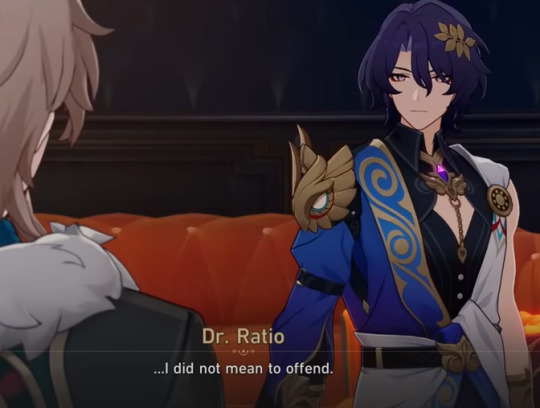
He worked hard to "betray" Aventurine but only as he was instructed to do, and immediately checks in on Aventurine's well-being afterward, even urging him to give up the plan if it becomes too much to handle.
And then, of course, there's the note: "Do stay alive. I wish you the best of luck."
After this point, it cannot be denied that Ratio is unequivocally on Aventurine's side, wants to help him, and is not doing so out of any sense of self-gain but largely because he is a good person who simply cares about Aventurine's fate. By the end of 2.1, it can no longer be doubted that Ratio is the exception to the "gender rule" of Aventurine's life, which--the story shows us again and again--was that guidance, protection, and care for Aventurine come from women, while men repeatedly represent dismissal, betrayal, or pain.
Ratio is, at least as far as Aventurine's story shows us, the proof that men can be good, that things are not as black and white in Aventurine's life as they might appear, and that--if you do choose to ship him with or see Aventurine as attracted to men--his attraction could be validated (and potentially reciprocated) by a male figure who would not bring additional harm to Aventurine's life. Aventurine makes the final decision to live after seeing Ratio's note--the exception to the rule ultimately proves to be the last piece needed to keep him alive.
But I promised I wasn't going to derail my own post about w o m e n, so let me get to the final point, and the one I really wanted to talk about: Although Ratio gets virtually all the credit for "saving" Aventurine in the fandom, Aventurine was actually saved by, you guessed it, another woman.
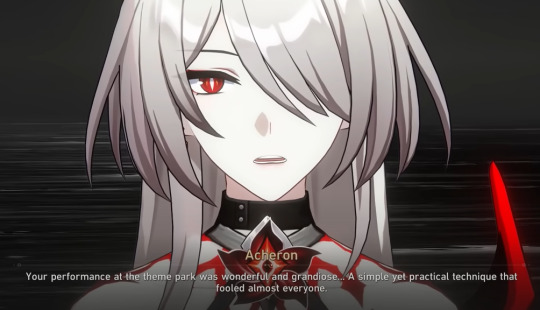
Not going to lie, the reason I started this post was specifically because I wanted to talk about how Acheron and Aventurine's dynamic was completely unexpected but actually fits flawlessly with the theme of feminine guidance in Aventurine's story.
Despite the fact that Aventurine made Acheron's life much harder and actively used her as a chip in his grand gamble, she doesn't blame or chastise him for those actions. Although she expresses some incredulity that Aventurine is actually that lucky, she then turns around and congratulations him for his ingenuity, immediately supporting him despite the fact that they don't even truly know each other.
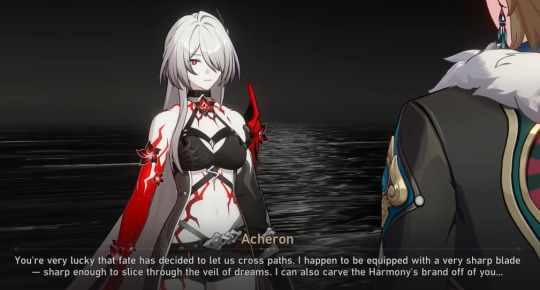
Then it gets even more interesting. Acheron, who frequently hits her companions with deep and sometimes very emotionally fraught questions, asks Aventurine: "Have you never wavered?"
We as players know for a fact that Aventurine is constantly wavering, constantly doubting himself, his luck, and whether he'll even live--or even wants to live--to see tomorrow. But we also know that Aventurine is not forthcoming about those truths, refusing to express them to anyone, even himself. The only way we hear those dark truths is through his "future" self (who by the way, is once again another male figure cutting Aventurine down--of course it's himself but it's also, from the player's perspective, once again reinforcing the message that he isn't going to find safety or kindness in an adult male presence). Aventurine almost constantly deflects and diverts when his emotions or struggles are brought to the fore (unless he's divulging them for the specific purpose of allowing someone else to weaponize them). "I'm fine," he says, like a lying liar who lies.
But he doesn't lie to Acheron.

He chooses to be completely candid with her, to lance open the deepest wound of his life--that he can win and win and win and still have lost everything. The glitz and the glamour has all been stripped away here, at the end of everything, and Aventurine finally feels safe enough to admit that he fears he has absolutely nothing in his life worth living for.
And then, we get this direct parallel: Aventurine looks to Acheron, the woman now before him, for guidance, for explanation, exactly as he looked to his sister in the past.
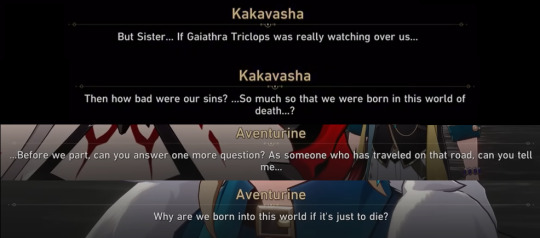
He needs help, he needs answers, and he is continually seeking that help from the female figures in his life, whose support and kindness echo the lost care of his mother and sister.
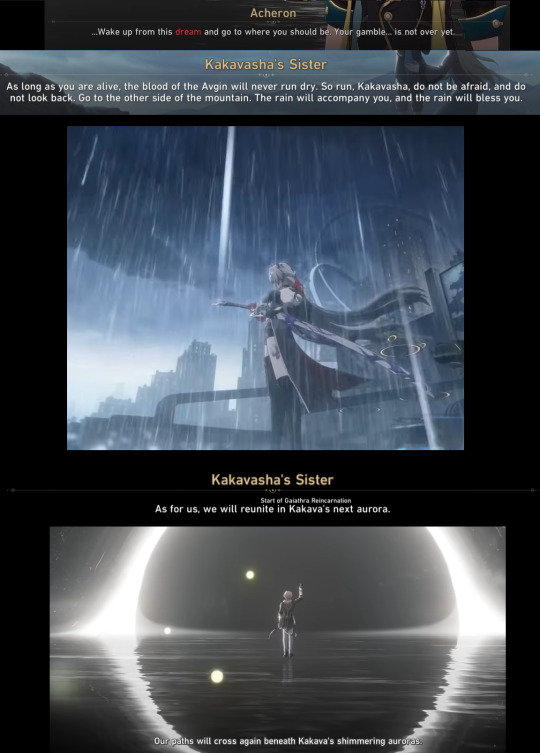
"Go where you should be," Acheron tells Aventurine, guiding him across the river of death just as his sister insisted that he flee through the rain toward life.
Look guys, Acheron's even the one who reminds Aventurine to look at Ratio's note in the first place because apparently being an emanator of Nihility gives you x-ray vision, but my girl just gets no credit at all for being Aventurine's real savior, come on now!! Yes, Ratio's note was the final reminder Aventurine needed that someone would be waiting for him on the other side, but Aventurine would never have even gotten to the point of being willing to read that note if Acheron hadn't stepped in and provided him an answer to his question.
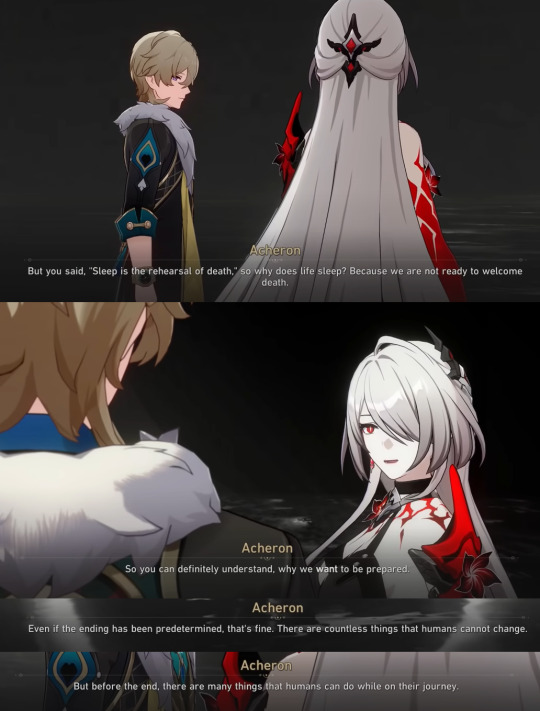
She feeds him back his own answer: "Why does life slumber? To rehearse the death for which we are not currently prepared." It is Acheron who reminds Aventurine that giving into the Nihility is pointless, and that rather than simply embracing a meaningless death, it is up to humanity itself to find and make meaning by living. It's this, not Ratio's note, that Aventurine gives as his reason for choosing to go on when asked by his own younger self. It's Acheron's words that finally give Aventurine an answer--why do we live just to die? Because there are people we can still make proud. Because when we go into death, we should do so with our heads held high, having achieved our own sense of purpose in this life.
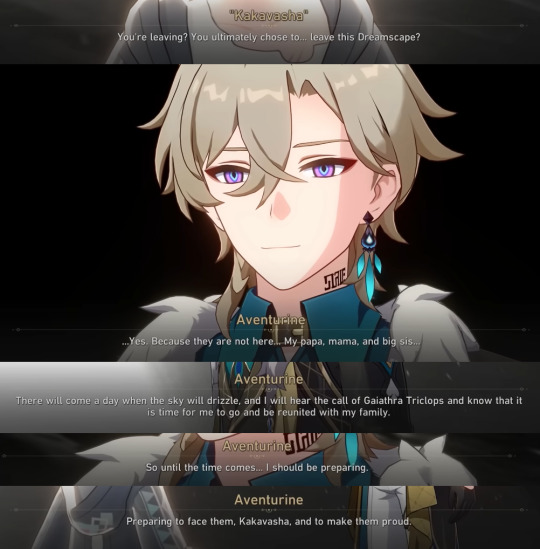
Ratio gave Aventurine a promise: Someone is waiting for you to come back.
But Acheron gave Aventurine a reason: If life is inherently meaningless, doesn't that just mean you are free to give it meaning yourself?
She saved him, as women have been saving him all his life.
Anyway, this has already been horrendously long, but really what I wanted to say is that I think it is absolutely fascinating how consistent Aventurine's writing is when it comes to portraying where his support comes from and who he seeks guidance from. (Psst, just in case you still haven't figured it out, it's women!) In virtually every instance we are shown, we see the message reinforced that women are Aventurine's greatest allies and role models, while male figures are continually positioned to intentionally or unintentionally let him down and cause him distress.
"But women playing the supporting role to a male character is nothing new, Star, why are you so excited by this?"
Because the role women are playing in Aventurine's life is not the subservient supporter and emotional crutch role that female characters all too often play to male counterparts. None of the women in Penacony or Aventurine's past were there to do the emotional labor for him, to be a trophy or prize, or to cater to his needs. They don't exist solely to help him fulfill his character motivations; they aren't following him around waiting for his next request as their only role in the plot.
Instead, with Aventurine's story, we almost have an inversion of gender roles, where the male character eschews the stereotypical "men are leaders, fighters, and stoic heroes" archetype. Instead, no matter how hard he tries to hide it and keep a stiff upper lip, it is clear from 2.0-2.1's story that Aventurine is a deeply insecure, lonely, and explicitly traumatized survivor of genocide, slavery, and exploitation. Unlike most male characters, who are very rarely portrayed as genuine victims--because come on, shouldn't men be strong enough to fight back? Shouldn't men be able to shrug it off when they are hurt, emotionally or physically? (Of course I'm rolling my eyes here!)--Aventurine is belittled, humiliated, emasculated, and victimized on-screen, roles almost exclusively reserved for women, for whom surviving victimization in fiction is seen as noble.
Meanwhile, the women in Aventurine's life take on the roles traditionally given to male characters. They're both emotionally and physically his protectors. Aventurine's sister gave her life to guard his safety; Acheron ensured he could safely pass beyond the river of Nihility into the Primordial Dreamscape. They give him the tools necessary to succeed where he could not succeed on his own. His plan could never have gotten off the ground without Topaz and Jade entrusting their Cornerstones to him. The knowledge and capabilities of the women around him--not their "feminine charms"--are what allow them to help keep Aventurine on the right path even though he does waver. Even women who disrespect him, like Sparkle, still play a positive role in his life, able to provide him insight gained with their own intellect and talents.
When he has no one to rely on and doesn't know what to do, Aventurine is able to continually turn to the women around him, asking for and receiving not servitude or fawning, but their genuine wisdom and guidance.
tl;dr: If nobody else has him, Aventurine knows this random woman he met two minutes ago on the street will have him, because the women in his life literally never let him down.
(It's just so, so good, and ultimately, it should be very clear why Aventurine's story is as popular with women as it is! A+, Hoyo!)
#honkai star rail#aventurine#Aventurine hsr#Acheron#She’s the goat I swear#dr ratio#aventio#boothill#hsr analysis#ipc as a metaphor for the patriarchy is not something I expected to stumble upon today#I’m so glad their downfall arc is going to prominently feature men to destroy it#as realistically that’s what we need irl as well to destroy systems of oppression#it’s a group project everyone!#anyways this made me even more excited for 2.3 if that was even possible#also if there’s one thing hoyo does its make actual decent female characters#like besides fanservice like 80% of my favorite women in fiction are hoyo characters#anyways great post
989 notes
·
View notes